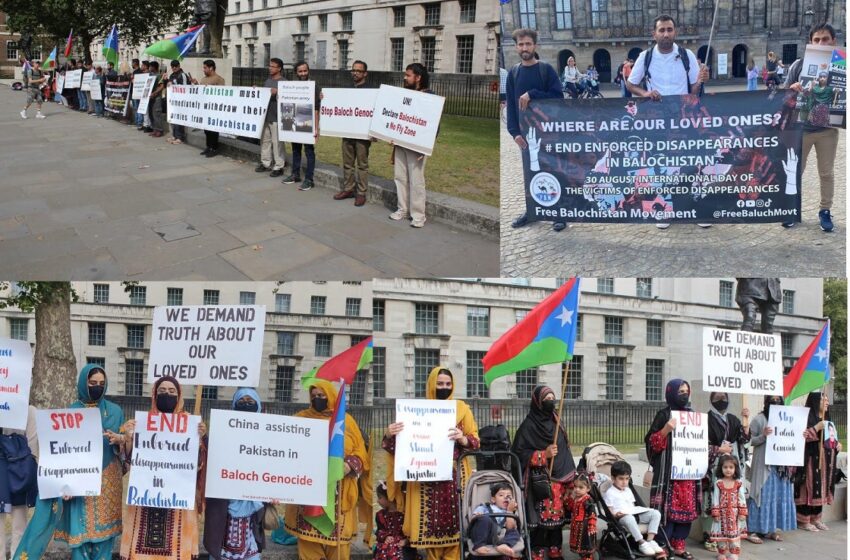Indian State Should Focus on Unconventional Methods: Jamal Nasir Baloch
Free Balochistan Movement protests Highlight Enforced Disappearances in Balochistan

LONDON: The Free Balochistan Movement held a protest outside the British Prime Minister’s official residence in London to raise awareness about enforced disappearances in Balochistan. Protesters carried banners, placards, and pictures of the disappeared, chanting against severe human rights violations in the region.
During the protest, Ibra Taj Baloch said, “August 30th, is International Day of the Disappeared, and this day is dedicated to standing up and speaking out against this injustice.” She mentioned that her father, Mir Taj Mohammad Sarparah, was abducted by the ISI on July 19, 2020, and even after four years, he is still in their custody.
Dr. Shahvazar Baloch, Vice President of Free Balochistan, also addressed the gathering. He said, “We are protesting today against the enforced disappearances in Balochistan because thousands of Baloch have been abducted in Pakistan and Iran, leading to severe hardships for their families.”
British activist Heather Joans, who participated in the protest, said, “I am an ordinary citizen, and I am here today to express solidarity with the Baloch against the heinous crime of enforced disappearances. It saddened me deeply to learn that there is hardly a single household in Balochistan that hasn’t been affected by abduction.”
Heather Joan further added that the British government should take a firm stance against the Pakistani authorities and make it clear to them that the genocide of the Baloch people is wrong and must be stopped immediately.
In addition to the Free Balochistan Movement members, a significant number of UK-based Baloch residents and British human rights activists participated in the protest.
AMSTERDAM: The Free Balochistan Movement’s Netherlands Branch held a similar protest in Amsterdam on the same day, emphasising the issue of enforced disappearances at the hands of Pakistani and Iranian forces. Baloch community members and Pashtun human rights activist Zar Ali Khan Afridi also joined the protest.
Dr. Latif Baloch, in his speech, called on international organisations to address ongoing human rights abuses in Balochistan, highlighting daily mental and physical torture inflicted by Pakistani forces.
Obaidullah Baloch, from the Free Balochistan Movement’s Executive Council, identified the occupation by Pakistan and Iran as the root cause of human rights violations, accusing Pakistan of exploiting Balochistan’s resources while violating the rights of its people.
Pashtun activist Zar Ali Khan Afridi attributed the genocide against Baloch and Pashtun people to Pakistani military actions, stressing the need for international intervention to end these oppressions.
Both protests sent a clear message to the global human rights community: the severe violations in Balochistan must no longer be ignored. The Free Balochistan Movement called on international organisations to hold Pakistan and Iran accountable and to take immediate steps to protect the fundamental rights to freedom and sovereignty.









